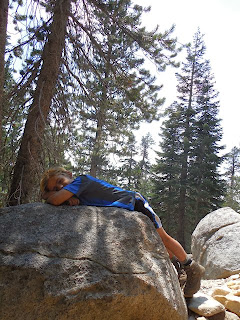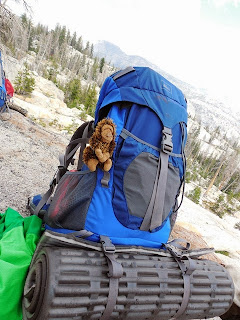As day broke, I crawled out of the tent into a world thick with smoke,
more smoke by far than we’d experienced during our first two days of hiking. A ranger we’d passed the previous afternoon
had ensured me that the Aspen Fire, the raging monster creating all that
airborne soot and ash was still more than seventy trail-miles away from my
family, burning southeast towards Mammoth Lakes. We were heading that way, but we were almost
two weeks away, and fire crews were making progress towards containing the
flames.
I shook my head and tried unsuccessfully to stretch the stiffness from
my body. The fire sure smelled closer
than that, like we’d been sleeping inside some giant barbeque pit. My throat turned scratchy. My eyes burned. And all the doubts that had plagued me, the
ones that questioned whether or not an everyday Joe like me could really
navigate more than two hundred miles of Sierra wilderness with two elementary
school kids, flared up all over again.
I’d imaged how healthy it would be for my boys to get away from San
Diego and breathe clear mountain air for a month. But this was like sucking on a muffler and
walking up Interstate 5. Was it even
safe for my kids to be out here? Kai had
flirted with developing honest-to-goodness asthma since he was a baby. Was this going to push him over the edge?
 The sun climbed over the distant mountains like some orange-pink ball
of fire in the sky. It was beautiful in
an alarming, post-apocalyptic sort of way, and it meant we’d have to reconsider
everything in Tuolumne Meadows. Maybe
this wasn’t our summer to hike the John Muir Trail. Maybe it had all been too much to bite off
anyway. Those thoughts left me feeling
dark and hazy like the sky as I scowled at the eerie sun and walked over to
pee on a bush.
The sun climbed over the distant mountains like some orange-pink ball
of fire in the sky. It was beautiful in
an alarming, post-apocalyptic sort of way, and it meant we’d have to reconsider
everything in Tuolumne Meadows. Maybe
this wasn’t our summer to hike the John Muir Trail. Maybe it had all been too much to bite off
anyway. Those thoughts left me feeling
dark and hazy like the sky as I scowled at the eerie sun and walked over to
pee on a bush.
There was nothing easy about that morning. We climbed more than two thousand feet while
smoke antagonized our throats and lungs.
The kids blew their noses more than normal, and their snot came out
black. At one point, just before midday,
as we trudged up a relentless series of switchbacks, Kai hit a wall. He’d had it.
He sat down heavily beside the trail and his body just sank onto the
rocks. He didn’t say much; he’d never
been the kind of kid to whine a lot. But
you could read his face like an open book.
Everything about that moment sucked for him. He didn’t want any part of any of it. He hated it.
We stopped and sat near him. I
pulled a Jolly Rancher from my pocket (part of a small stash I’d brought to
bolster the kids in tough moments), and unscrewed a water bottle for him. “You can do this, buddy.”
But it was Pam that really helped him, her unorthodox creativity, her ability
to commiserate before attempting to bolster.
“This hill sucks. Tell you what,
when you make it to the top you can say one cuss word as loud as you want.”
His eyes lit up. He nearly
choked on his Jolly Rancher.
“Just one,” she clarified and smiled at him. “After you make it.”
“As loud as I want?”
“As loud as you want.”
I looked at the two of them and laughed. It was ridiculous. It was questionable parenting… and it worked
brilliantly! We rested for a few more
minutes, passing around a water bottle, and when I said we should probably push
on Kai was the first to shoulder his pack.
We couldn’t see the crest of the hill for a long time. It just went up and up through the trees,
switchback after switchback. But eventually
the climb ended on a wide ridge topped with the kind of boulders Fred
Flintstone and Barney Rubble used to build their homes. A breeze had kicked up, cooling our skin and
dispersing some of the smoke. They sky
was actually shifting from gray to blue.
Dozens of fritillary butterflies floated around us, their wings a
brilliant yellow-orange with black spots.
 I took off my pack and inhaled deeply of the somewhat less hazy air,
not paying much attention to Kai as he climbed to the top of the tallest
rock. He spread his arms, the wind tousling
his hair, and he yelled with all his might.
I took off my pack and inhaled deeply of the somewhat less hazy air,
not paying much attention to Kai as he climbed to the top of the tallest
rock. He spread his arms, the wind tousling
his hair, and he yelled with all his might.
Of course I couldn’t know it then, but that was a turning point for Kai
and for our journey. Our strategy had
admittedly been irreverent. We’d let our
son yell the holy mother of curse words at the top of his lungs from a mountain
ridge. But it worked. The smoke, while lingering for several more
days, diminished steadily, and our son gradually grew stronger.
That afternoon the wind continued to sweep soot from the air, and by
the time we reached camp for the night the sky was blue with a scattering of
soft, white clouds. I pitched our tent
on a narrow shelf of rock, the door facing east so we could watch the sunrise
through the screen as we woke the next morning.
Then I went to filter water and soak my feet in a small stream that ran
playfully off the side of Sunrise Mountain.
Wildflowers grew like scattered pieces of rainbow in a meadow beside the
creek, and as I let the water numb my feet I picked a few stalks of wild onion
and chewed them.
The boys played, running across wide slabs of granite that sloped haphazardly
for several hundred feet before reaching the Cathedral Fork of Echo Creek. They ran as if we’d never hiked at all, as if
they’d never been tired or cussed a hill.
But eventually they settled in the shade of a juniper tree and entered
some imaginary world of their own creation.
You could tell by their faces, by the way they lingered together without
finding something stupid to argue about, that the imaginary world they’d
created was a cool place, somewhere worth spending time.
 After dinner we lit a small fire and sat beside it as I read another
chapter of The Hobbit out loud. The sun set, enlivening Matthes Crest and a
million small peaks around our campsite with alpenglow. The wind had died, the first stars visible in
the eastern sky, and as I watched the sky darken something inside me started to
give way—some uncomfortable structure that I’d built inside myself over the
previous two decades of career and trying to be a grownup and struggling to
keep my family’s heads above water financially.
It was a structure that I’d hardly paid attention to really, but it
framed my mind and stretched down into my body.
It poked my lower back, slumped my shoulders and made me want to pop my
neck all the time. It was a structure I’d
built unintentionally each day while sitting in my cubicle, racing home on the
interstate with a millions other rats, and opening the mortgage statement to
wonder how we could manage it.
After dinner we lit a small fire and sat beside it as I read another
chapter of The Hobbit out loud. The sun set, enlivening Matthes Crest and a
million small peaks around our campsite with alpenglow. The wind had died, the first stars visible in
the eastern sky, and as I watched the sky darken something inside me started to
give way—some uncomfortable structure that I’d built inside myself over the
previous two decades of career and trying to be a grownup and struggling to
keep my family’s heads above water financially.
It was a structure that I’d hardly paid attention to really, but it
framed my mind and stretched down into my body.
It poked my lower back, slumped my shoulders and made me want to pop my
neck all the time. It was a structure I’d
built unintentionally each day while sitting in my cubicle, racing home on the
interstate with a millions other rats, and opening the mortgage statement to
wonder how we could manage it.
The structure didn’t break that evening, but I noticed it. I questioned it. And it cracked a little.
Read the full series by clicking on the links below:
Day 1 – Day2 – Day 3 – Day 4 – Day 5 – Day 6 – Day 7 – Day 8 – Day 9 – Day 10 – Day 11 – Day 12 – Day 13 – Day 14 – Day 15 – Day 16 – Day 17 – Day 18 – Day 19 – Day 20 – Day 21 – Day 22 – Day 23 – Day 24 – Day 25 – Day 26 – Day 27 – Day 28 – Day 29 – Day 30 – Day 31 – Day 32 – Day 33 – Day 34
Day 1 – Day2 – Day 3 – Day 4 – Day 5 – Day 6 – Day 7 – Day 8 – Day 9 – Day 10 – Day 11 – Day 12 – Day 13 – Day 14 – Day 15 – Day 16 – Day 17 – Day 18 – Day 19 – Day 20 – Day 21 – Day 22 – Day 23 – Day 24 – Day 25 – Day 26 – Day 27 – Day 28 – Day 29 – Day 30 – Day 31 – Day 32 – Day 33 – Day 34
J.S. Kapchinske is the author of Coyote Summer



















